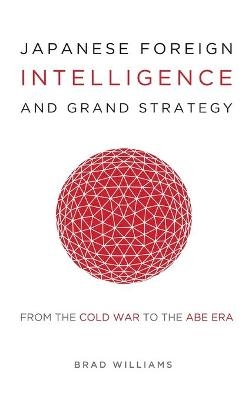
Japanese Foreign Intelligence and Grand Strategy
Georgetown University Press (Verlag)
978-1-64712-063-4 (ISBN)
Japanese foreign intelligence is an outlier in many ways. Unlike many states, Japan does not possess a centralized foreign intelligence agency that dispatches agents abroad to engage in espionage. Japan is also notable for civilian control over key capabilities in human and signals intelligence. Japanese Foreign Intelligence and Grand Strategy probes the unique makeup of Japan's foreign intelligence institutions, practices, and capabilities across the economic, political, and military domains and shows how they have changed over time.
Brad Williams begins by exploring how Japan’s experiences of the Second World War and its new role as a major US ally influenced its adoption of bilateralism, developmentalism, technonationalism, and antimilitarism as key norms. As a result, Japanese intelligence-gathering resources centered primarily around improving its position in the global economy throughout the Cold War. Williams then brings his analysis up to the Abe Era, examining how shifts in the international, regional, and domestic policy environments in the twenty-first century have caused a gradual reassessment of national security strategy under former prime minister Shinzo Abe. As Japan reevaluates its old norms in light of regional security challenges, the book concludes by detailing how the country is beginning to rethink the size, shape, and purpose of its intelligence community.
Anyone interested in Japanese intelligence, security, or international relations will welcome this important contribution to our understanding of the country's intelligence capabilities and strategy.
Brad Williams is an associate professor in the Department of Asian and International Studies at the City University of Hong Kong. He has studied, taught, and conducted research in Australia, Japan, Singapore, Hong Kong, Myanmar, Taiwan, and the United States. He is the author of Resolving the Russo-Japanese Territorial Dispute: Hokkaido-Sakhalin Relations and has also coedited and translated a number of volumes, including Japan in Decline: Fact or Fiction?
List of Illustrations Acknowledgments Conventions
List of Abbreviations
Introduction: Normalizing Japan’s Foreign Intelligence System
1. Japanese Grand Strategy and Embedded Norms: From the Yoshida Doctrine to an Abe Doctrine
2. US Covert Action in Japan: Nurturing a Bilateralism-Adhering Junior Ally
3. Beneath the Umbrella: Bilateralism and Japanese Cold War Foreign Intelligence
4. Technology Quest: The Foreign Economic Intelligence System of a Developmental State
5. Japan’s Foreign Intelligence System: The Impacts of Antimilitarism and Sectionalism
6. Reinstitutionalizing Grand Strategy: Japan’s Evolving Foreign Intelligence System
Conclusion: Eschewing Unorthodoxy in International Intelligence
Bibliography
Index
About the Author
| Erscheinungsdatum | 10.05.2021 |
|---|---|
| Zusatzinfo | 3 Tables, unspecified; 6 Figures |
| Verlagsort | Washington, DC |
| Sprache | englisch |
| Maße | 152 x 229 mm |
| Gewicht | 608 g |
| Themenwelt | Sachbuch/Ratgeber ► Sport ► Kampfsport / Selbstverteidigung |
| Geisteswissenschaften ► Geschichte ► Regional- / Ländergeschichte | |
| Sozialwissenschaften ► Politik / Verwaltung ► Europäische / Internationale Politik | |
| Sozialwissenschaften ► Soziologie ► Spezielle Soziologien | |
| Technik | |
| ISBN-10 | 1-64712-063-2 / 1647120632 |
| ISBN-13 | 978-1-64712-063-4 / 9781647120634 |
| Zustand | Neuware |
| Haben Sie eine Frage zum Produkt? |
aus dem Bereich


